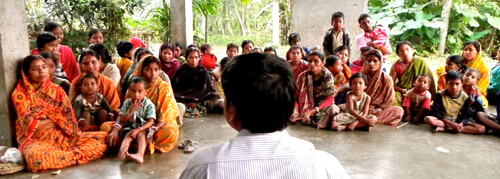By James Tabafunda
Northwest Asian Weekly

Photo: Landesa, Center for Women’s Land Rights
Poverty restricts options.
In rural India, it leaves girls – ages 11 to 18 – without an education and hope as they become easy targets for human traffickers or adults seeking child brides.
Landesa, a Seattle-based nonprofit, empowers Indian adolescent girls through its Girls Project by helping them realize their land rights. The Girls Project provides opportunities to develop micro-plots of land – the size of a tennis court – and grow vegetables such as bottle gourds and mushrooms to feed themselves or sell to others.
Melany Grout, an attorney and land tenure specialist at Landesa, said, “The idea is that if a girl is able to actually earn some money … the money itself can be something that helps alleviate some of the pressure to marry her off.” The money also allows these girls to go back to school.
She made her first visit to West Bengal, India in 2012 and still remembers the frantic activity of day-to-day life there.
Dedicated to work involving basic human rights, she said, “When I saw Landesa and an opportunity to work here, I was fully convinced that this question of a right to land has everything to do with fundamental rights.”
Four times a year, she travels to West Bengal, a town filled with banana trees and vast rice paddies, to visit the girls helped by the Girls Project and to keep Landesa’s crucial partnership with the Indian government and local community workers strong and effective. Landesa has more than 40 years of experience working with governments.
“One of the things I felt most strongly being in West Bengal and, in particular, in the project areas, is that you see these girls who grew up really differently from how I grew up,” she said.
Poor Indian families are more likely to pay for the schooling of male children. Instead of learning in a classroom, Grout says adolescent girls can be found carrying wood and water by the side of the road, herding animals, and taking care of laundry.
“When you talk to them, they have the same dreams,” she said. “They want to be something, and they would like to decide that.” Compounding the challenge of poverty, the lower social status of Indian women means they have no say in decision-making about their future as well as their family’s land and money. Changing this cultural norm has been the biggest challenge for the Girls Project.
In mid-2010 the Girls Project began with a few hundred girls in about 20 villages. The experiment succeeded in getting families to place a higher value on them and thus, offered different options than just getting married. The program contributes to self-sufficiency and pride. Today, the Girls Project has helped more than 40,000 girls in the Cooch Behar district of West Bengal. More than 200,000 families in India have also received micro-plots of land.
Grout will return to India in January to work on the next phase for the Girls Project: getting its straightforward model to work even better. “And then, think about where else we can do this,” she adds.
The project is one of many Landesa undertakes. “Our work in China is very different,” said Rena Singer, Landesa communications director. “(It) is improving the tenure security of the farmers who are farming the land in China because … the farmers don’t actually own the land that they’re farming. It’s owned by the government.”
“I think this idea of working with adolescent girls and empowering them in rural areas is something that could apply in a lot of parts in the world, including other areas in Asia,” Grout said.
“It can change the girl’s life, her family, communities, the nation.” (end)
For more information about the Girls Project, go to http://www.landesa.org/women-and-land/programs-and-projects/security-for-girls-through-land-project-girls-project/.
James Tabafunda can be reached at info@nwasianweekly.com.



